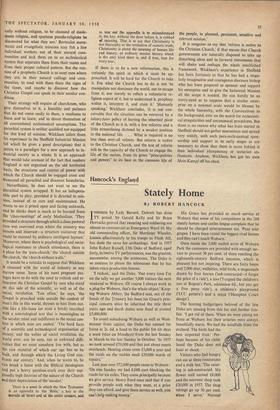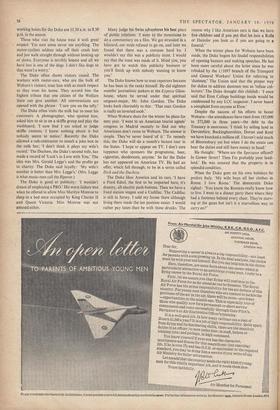Hancock's England
Stately Home
By ROBERT HANCOCK INSPIRED by Lady Barnett, Debrett has done TV proud. Sir Gerald Kelly and Sir Brian Horrodks proved that swearing and soldiering are almost as commercial as Emergency Ward 10. My old commanding officer, Sir Mortimer Wheeler, known affectionately to his troops as Flash Alf, has done the same for archteology. And in 1957 John Robert Russell, 13th Duke of Bedford, aged forty, in twelve TV performances, was the greatest, successwise, among the aristocrats. The Duke is so anxious to please the telemasses that he has taken voice-production lessons.
'I reckon,' said the Duke, 'that every time I'm on the telly we get another 5,000 visitors the next weekend to Woburn. Of course I always work in a plug for Woburn, that's the whole object.' Keep- ing Woburn Abbey, the Bedford seat, out of the hands of the Treasury has been his Grace's prin- cipal concern since he inherited the title three years ago and death duties now fixed at around £5,000,000.
To avoid subsidising Woburn as well as West- minster from capital, the Duke has opened his home at 2s. 6d. a head to the public for six days a week (shut on Mondays) from the last Sunday in March to the last Sunday in October. 'In 1957 we took around £70,000 and that just about meets overheads. Heating alone costs £5,000 a year and the roofs on the stables need £20,000 worth of repairs.'
Last year over 372,000 people came to Woburn : 'On one Sunday we had 8,000 cars blocking the roads for six miles. They come principally because we give service. Henry Ford once said that if you provide people with what they want, at a price they can afford, and give them service as well, you can't help making money.' His Grace has provided SQ much service at Woburn that some of his competitors in the 200 stately homes and castles league complain that he should be charged entertainment tax. 'Pure sour grapes. I have been round the biggest rival homes and they can't touch Woburn.'
Once inside the 3,000 walled acres of Woburn Park the customers are provided with enough ser- vice to prevent 30 per cent. of them reaching the eighteenth-century Bedford mansion, which is pleasant but not inspiring. There are forty bison and 2,000 deer, wallabies, wild birds, a stagecoach drawn by four horses ('sub-contracted-1 forget the price of a ride'), a zoo CI copied the children's zoo at Regent's Park, admission 6d., but you get a free pony ride'), a children's playground ('LCC pattern') and a maze ('Hampton Court design').
The homing budgerigars beloved of the late Duke are missing from this fur and feather fun- fair. 'I got rid of them. When we were young we froze at Woburn but their aviaries were always beautifully warm. We had the windfalls from the orchard. The birds had the best imported fruit.' Per- haps because of his child- hood the Duke does not hunt or shoot.
Visitors who feel hungry can eat at three restaurants and a milk bar. 'The cater- ing is sub-contracted. My flower stall earned £8,000 and the souvenir shop took £20,000 in 1957. The shop takings go up 30 per cent. when I serve.' Normal working hours for the Duke are 11.30 a.m. to 8.30 p.m. in the season. Those who visit the house treat it with great respect. 'I'm sure some never see anything. The motor-cyclists seldom take off their crash hats and just walk straight through without looking up or down. Everyone is terribly honest and all we have lost is one of the dogs. I don't like dogs so that wasn't a worry.'
The Duke often shows visitors round. The workers with motor-cars, who are the bulk of Woburn's visitors, treat him with as much respect as they treat his home. They accord him the highest tribute that one citizen of the Welfare State can give another. All conversations are opened with the phrase : 'I saw you on the telly.' The Duke often visits the milk bar to meet his customers. A photographer, who spotted him, asked him to sit in on a skiffie group and play the washboard. 'I now find I am asked to judge skiffle contests. I know nothing about it but nobody seems to notice.' Recently the Duke allowed a sub-contractor to install a juke box in the milk bar; 'I don't think it plays my wife's record.' The Duchess, the Duke's second wife, has made a record of 'Luck's in Love with You.' The idea was Mrs. Gerald Legge's and the profits go to charity. The Duke said loyally : 'My wife's number is better than Mrs. Legge's.' (Mrs. Legge is what music-men call the fiipover.) The Duke is good at publicity: 'I wouldn't dream of employing a PRO.' His worst failure was when he offered to allow Miss Marilyn Monroe to sleep in a bed once occupied by King Charles II and Queen Victoria. Miss Monroe was not amused either. Many judge his Swiss, adventures his best piece of public relations. 'I went to, the mountains to do a commentary on a film. We got stranded in a blizzard, our mule refused to go on, and later we found that there was a crevasse hard by. I wouldn't say this was a publicity stunt. I would say that the most was made of it. Mind you, you have got to watch this publicity business or you'll finish up with nobody wanting to know you.'
The Duke knows how to treat reporters because he has been in the ranks himself. He did eighteen months' journalistic jankers at the Express Glass- house, where he served under that spiritual sergeant-major, Mr. John Gordon. The Duke looks back charitably to this : 'That man Gordon is really an inverted snob.'
When Woburn shuts for the winter he plans for next year. 'I went to an American tourist agents' congress in Madrid recently to find out why Americans don't come to Woburn. The answer is simple. They've never heard of it.' To remedy this, the Duke will do a month's lecture tour in the States. 'I hope to appear on TV. I don't care tuppence who sponsors the programme, beer, cigarettes, deodorants, anyone.' So far the Duke has not appeared on American TV. He had an offer, which fell through, to be in a series called Dick and the Duchess.
The Duke likes America and its cars. 'I have a Ford Edsel, the first to be imported here, it's dreamy, all electric push-buttons. Then we have a Ford station wagon and a Cadillac. The Cadillac is still in Jersey. I sold my house there although living there made the tax position easier. I would rather pay taxes than be with those drunks. The reason why 1 like American cars is that we have five children and if you put that lot into a Rolls or Daimler you look as if you are going to a funeral.'
When the winter plans for Woburn have been made, the Duke begins his feudal respbnsibilities of opening bazaars and making speeches. He has been more careful about the latter since he was rebuked by the 1/1097 branch of the Transport and General Workers' Union for referring to 'dustmen.' The Union said that the proper way for dukes to address dustmen was as 'refuse col- lectors.' The Duke thought this childish : 'I once said that Eton College buildings inside would' be condemned by any LCC inspector. I never heard a complaint from anyone at Eton.'
Despite the success of his efforts to boost Woburn—the attendances have risen from 185,000 to 372,000 in three years—the debt to the Treasury is enormous. 'I think by selling land in Devonshire, Buckinghamshire, Dorset and Kent we have knocked a million off. I haven't sold much of Bloomsbury yet but when I do the estate can bear the duties and still have money in hand.'
He thought : 'Where are the Spectator offices? In Gower Street? Then I'm probably your land- lord.' He was assured that the property is in splendid condition.
When the Duke goes on his own holidays he prefers Italy. 'My wife buys all her clothes in Rome. I love Rome.' The democratic Duke sighed : 'You know the Romans-really know how to live. I went to a dinner party there where they had a footman behind every chair. They're starv- ing at the gates but isn't it a marvellous way to carry on?'



































 Previous page
Previous page